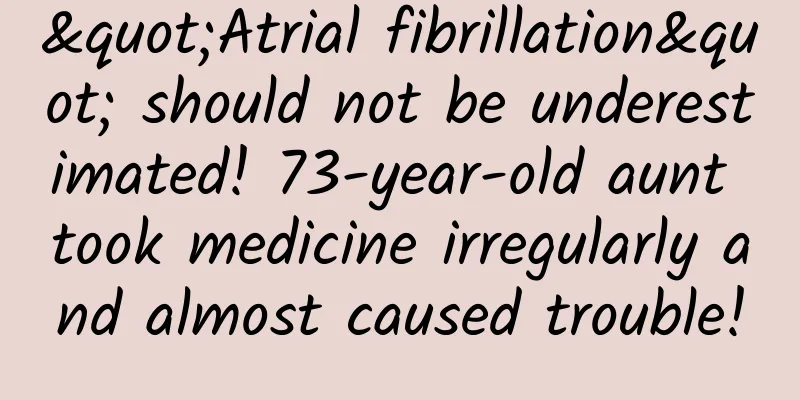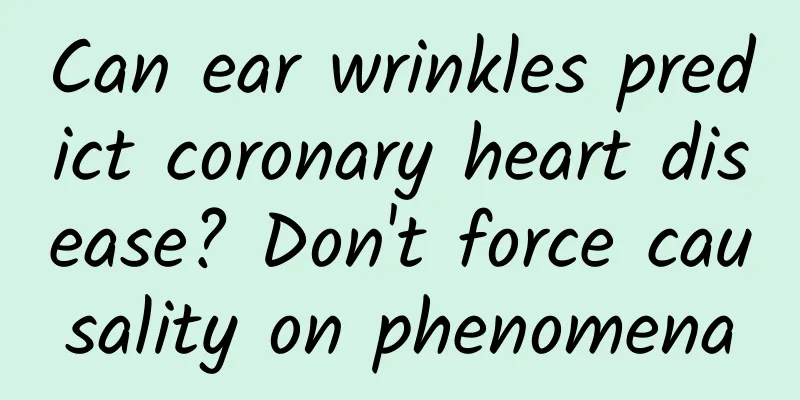"Atrial fibrillation" should not be underestimated! 73-year-old aunt took medicine irregularly and almost caused trouble!

|
The 73-year-old aunt is a retired teacher. She went to the hospital for a sudden heart attack and was diagnosed with atrial fibrillation, or AF for short. The doctor reminded her that she must take medication regularly to control her heart rate and prevent blood clots. At first, the aunt did not take this "little discomfort" seriously, after all, the medicine prescribed by the doctor seemed to effectively relieve her symptoms. Later, the aunt always felt that "taking too much medicine is not good", and often reduced or stopped taking medicine on her own after the symptoms were relieved. However, it was this irregular medication or random discontinuation of medication that almost caused a disaster! On an ordinary night, Auntie and her husband chatted all night. At 5 a.m., Auntie suddenly lost her voice, her left limbs became numb and weak, and she felt nausea and vomited. Then she developed obvious hemiplegia. Her family rushed her to Hunan Wangwang Hospital . After a quick and complete examination, the doctor quickly diagnosed Auntie with "cerebral artery embolism", and the culprit was the embolus that was formed and detached due to atrial fibrillation. Figure 1: The detached embolus blocked the right middle cerebral artery Time is life. For patients with cerebral artery embolism, every minute of delay may increase the risk of permanent brain damage. With the understanding and consent of her family, the aunt was rushed to the operating room for a "mechanical thrombectomy". In the operating room, Huang Longfei, deputy chief physician of the interventional group of the Neurological Medicine Center, and his team began to work in an orderly manner. This is a high-risk and difficult operation that requires extremely delicate operating skills and quick reaction ability. Through cerebral angiography, Dr. Huang accurately located the location of the embolism, and then carefully inserted a thin thrombectomy device into the blood vessels of the aunt's head. As the device slowly moved forward, the embolus that caused the aunt's hemiplegia was finally successfully captured. With the embolus removed, the aunt's life regained hope! Figure 2: After the embolus was removed, the blood vessels returned to normal After the operation, the aunt was sent to the intensive care unit for close observation. Two hours after the operation, the patient woke up. From the initial speech disorder and complete hemiplegia to being able to speak normally and move freely, the aunt finally recovered to normal. The patient's family and medical staff were relieved and overjoyed. Atrial fibrillation is a common arrhythmia characterized by rapid and irregular beating of the heart's upper chambers (atria), which leads to decreased heart efficiency and blood easily accumulates in the atria to form blood clots. According to statistics, the risk of thromboembolic events in patients with atrial fibrillation is much higher than that of ordinary people, among which cerebral embolism is one of the most common complications. So how can patients with atrial fibrillation manage themselves correctly? 1. Take medication regularly: Patients with atrial fibrillation must take medication strictly according to the doctor's instructions and must not increase or decrease the dosage or stop taking the medication at will. 2. Regular monitoring: Patients should go to the hospital regularly for electrocardiogram and blood tests to keep abreast of changes in their condition. 3. Healthy lifestyle: A healthy lifestyle such as quitting smoking and limiting alcohol consumption, controlling weight, exercising moderately, and eating a balanced diet is also important for the management of atrial fibrillation. 4. Seek medical attention promptly: If you experience any discomfort, you should seek medical attention immediately. Do not delay so as not to miss the best time for treatment. Huang Longfei, deputy chief physician of the Neurological Medicine Center of Hunan Want Want Hospital, kindly reminds us: Auntie's story reminds us: Atrial fibrillation should not be taken lightly, and irregular medication may bring serious consequences. Through regular medication, regular monitoring and active lifestyle adjustments, we can effectively manage atrial fibrillation and reduce the risk of related complications. Let us pay attention to heart health together and cherish every heartbeat!
(Edited by Wx) |
Recommend
Bleeding for 20 days during early pregnancy
At 20 days of pregnancy, you are in the early sta...
Can I eat chicory during menstruation?
Chicory, whose flowers are light blue chrysanthem...
What's wrong with the genital bulge?
The female reproductive organs are very fragile a...
Is it necessary to do amniocentesis after non-invasive
Some pregnant women need to do amniocentesis duri...
Why do we need white vinegar to make dough? What is the ratio of baking soda to white vinegar?
We all know that the reason why steamed buns and ...
Can a woman still have sex when she is pregnant?
After a woman becomes pregnant, she should not ha...
Why do girls have cold limbs?
A healthy body is particularly important for ever...
What happens if a woman has too much sex?
In life, there are some young couples who have fr...
How long should a girl hold a plank?
Plank is an exercise and fitness that many people...
How much weight can you lose with the 21-day diet? If you want to know, just read it.
The 21-day weight loss method is one of many weig...
Can I have sex on the third day of my period?
Women's menstruation is a condition in which ...
What does it mean when a woman dreams of eating a snake?
Snakes are very repugnant to many people. They ar...
What causes vomiting blood during early pregnancy?
Women in the early stages of pregnancy will exper...
What causes bad breath during pregnancy?
Due to the influence of growth hormone, many preg...
Can patients with hypoglycemia undergo abortion?
For female friends, although abortion will not ca...









